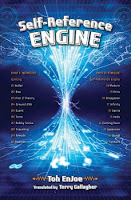 Author: Toh EnJoe
Author: Toh EnJoe
Translator: Terry Gallagher
U.S. publisher: Viz Media
ISBN: 9781421549361
Released: March 2013
Original release: 2007
Although several of Toh EnJoe’s short stories and essays have been translated into English, Self-Reference Engine is his first book-length work to be released. Originally published in Japan in 2007, Self-Reference Engine was released by Viz Media’s speculative fiction imprint Haikasoru in 2013 with an English translation by Terry Gallagher. Having previously read and thoroughly enjoyed EnJoe’s shorter works, I was very excited for the English release of Self-Reference Engine. Before leaving academics to focus on his writing, EnJoe cultivated a strong background in theoretical physics and mathematics. As a result, his fiction is often quite intellectually stimulating in addition to being entertaining. Self-Reference Engine is no exception. Haikasoru even brought in a consulting physicist (Phil Kaldon, who also happens to be a science fiction author) to ensure the accuracy of its translation.
Self-Reference has been described as being neither a novel nor a short story collection, but whatever it is, it’s great stuff. The work consists of twenty chapters (twenty-two if counting the prologue and epilogue) divided into two parts: “Nearside” and “Farside.” Most of the stories can be read independently from one another, but Self-Reference Engine does build upon itself as the book progresses. Even when it’s not particularly obvious, all of the stories are closely linked as a whole, often in surprising and unexpected ways. Self-Reference Engine explores the collapse of the space-time continuum and the collision of multiverses, how humans try to deal with the situation (or attempt to simply ignore it), the development of highly advanced artificial intelligence systems known as “giant corpora of knowledge” in order to cope with the chaos, and the consequences of their creation.
One thing that surprised me about Self-Reference Engine was how funny and amusing it was. EnJoe has a very quirky sense of humor that comes through even in translation. (Also, major kudos to Gallagher on his work on Self-Reference Engine; the translation is great.) Many of the stories in Self-Reference Engine are rather strange and absurd, which I found to be very appealing and certainly very fitting for a work in which logic either operates in bizarre ways or not at all. If it were possible, I would recommend that all of the chapters be read simultaneously as they overlap and merge in space and time; everything is both happening and not happening at once. Failing that, attentive readers will note and be aware of the odd layering that EnJoe employs. Self-Reference Engine is wonderfully weird.
As funny as Self-Reference Engine is, the book is also incredibly smart. As might be expected from a work called Self-Reference Engine, it is constantly making references to itself, but it is also filled with historical, philosophical, literary, mathematical, and scientific allusions. I’m fairly certain that I didn’t catch them all, but those that I did were highly entertaining. Frequently, Self-Reference Engine delves and incorporates into the narrative legitimate concepts of theoretical mathematics and physics. It can be very cerebral and delightfully convoluted, but at the same time EnJoe maintains a sense of lightness and strangeness throughout the work. So don’t worry, an advanced degree isn’t necessary to enjoy the stories. Self-Reference Engine is quirky, weird, funny, smart, and clever. It made me tremendously happy to read and I enjoyed every odd, mind-bending moment of it.
